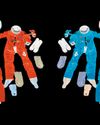
Question:
I read your column on feeding the gut microbiome and, as a lover of honey, was encouraged to see it listed as a prebiotic. However, many argue that honey is just another form of sugar, to be avoided. Is the research on honey as a prebiotic to be trusted?
Answer:
Human use of honey for health reasons dates back some 8000 years, with Stone Age paintings depicting its use, along with records of Egyptians, Assyrians, Greek, Romans and Chinese using honey for wounds and gut problems.
Closer to home, mānuka honey is prized for its medicinal properties. The honey comes from bees who forage on our native manuka trees, which are considered a taonga by Māori, who have a long history of using the mānuka tree to treat a wide range of health issues, including stomach problems.
But where does research sit on the use of honey for gut health? Many honey types have well established scientific evidence of antibacterial, anti-inflammatory, wound-healing and antioxidant activities. Some varieties are known to be especially potent in this regard, most notably manuka.
Honey also contains non-digestible oligosaccharides (a form of carbohydrate), and emerging research from laboratory, animal and some pilot human studies suggests they have a prebiotic capability.
Prebiotic is the name given to non-digestible compounds found in food that promote the growth or activity of helpful microbes in our gut. Probiotics are the live microorganisms that are fed by the prebiotics. In layman's terms, probiotics are the beneficial little critters that live in your gut, and prebiotics are essentially the fertiliser you feed them with.
Bu hikaye New Zealand Listener dergisinin July 1-7 2023 sayısından alınmıştır.
Start your 7-day Magzter GOLD free trial to access thousands of curated premium stories, and 9,000+ magazines and newspapers.
Already a subscriber ? Giriş Yap
Bu hikaye New Zealand Listener dergisinin July 1-7 2023 sayısından alınmıştır.
Start your 7-day Magzter GOLD free trial to access thousands of curated premium stories, and 9,000+ magazines and newspapers.
Already a subscriber? Giriş Yap

Sights to behold
Being blind didn't deter Aucklander FRASER ALEXANDER and his partially-sighted wife from travelling in Europe. Their memories were shaped by sound, touch and smell.

Pages of delight
Charming survey of children's literature throughout the centuries should be treasured and reread.

Heart of the matter
Women are less likely to be diagnosed with heart disease than men, and less likely to get best treatment. Researchers are struggling with old stereotypes to right the balance.

Balaclava beats
Their paramilitary shtick is intentionally menacing, offensive and alienating, but to be fair to the hip-hop trio Kneecap, their infamous balaclava is disarmingly hilarious. Kneecap, the 2024 movie that offers a fictionalised account of their rise to fame, is a Bafta- and Oscar-nominated Northern Irish film sensation.

Friends like these
One of the stranger characteristics of the populist oligarchy mobilising around Donald Trump's new administration is the interest taken in the domestic politics of the UK.

Irresistible force
A new documentary about gentle rugby giant Jonah Lomu reveals little but is a reminder of what made him special.

Fleeing the nest
A tale of building a new life after an abusive relationship makes for an impressive debut.

Life less ordinary
Chelsie Preston Crayford follows a big 2024 with a new comedy role and putting the finishing touches on her debut feature as a director and writer.

Not on our watch
Nasa, one of the most technologically advanced organisations on the planet, made prospective astronauts take inkblot tests to determine their sexuality.

No free lunch
The new, cut-price school lunch programme will shut out many community providers. But will bulk-supplied meals meet children’s needs?